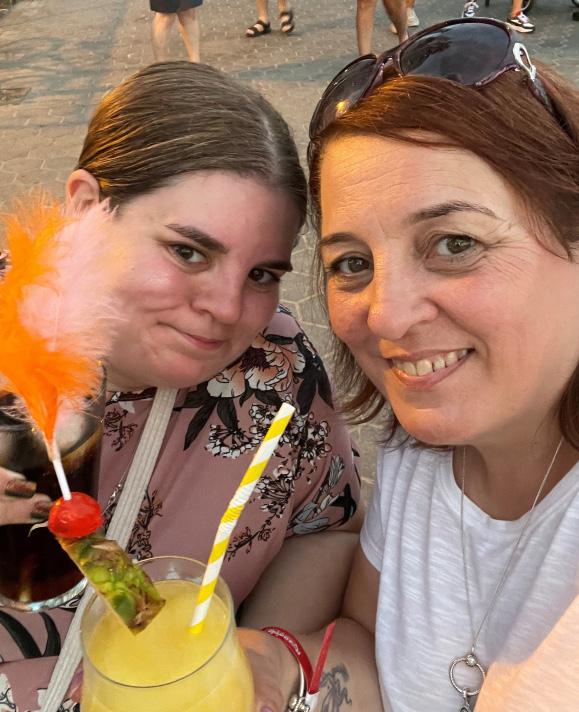
5 minute read
Raising awareness of Mitochondrial Disease
Mitochondrial diseases are a group of genetic conditions that affect how mitochondria in your cells produce energy. Mitochondria produce most of the energy your body needs. If you have a mitochondrial disease, your cells can’t produce enough energy.
Meet Alex, she is 33 years old and has Mitochondrial Disease. This is Alex’s story as told by her mum, Cheryl, who is a patient safety incident coordinator within Team NWAS.

“I was only 20 years old when I gave birth to Alex. We didn’t get off to such a good start as she was so unhappy as a baby, crying all the time and feeding every 1-2 hours, only taking minimal amounts and mostly vomiting that back up. We just went around in circles, and it was exhausting.
“Alex didn’t meet many of her milestones on time; she met them eventually but later than everyone else her age.
“We took Alex to our local child development centre and saw the paediatrician there, who felt Alex would benefit from a brain scan due to being unable to speak and being very hyperactive.
“We had various tests at our local hospital and finally got a diagnosis in 1997. The consultant told us Alex’s brain was damaged, and it was a part that affected speech, language, coordination, and behaviour. She told us very abruptly that Alex would never go to university, get married, have children, or hold an intelligent conversation and that was the end of the conversation.
“Alex’s dad Gary and I walked out of the hospital that day winded with no help or support and to say we were devastated was an understatement.”

“In 2008, Alex’s grandad had a heart attack, and Alex was present at the house when he became unwell, and the ambulance arrived. Up until this point, Alex had been living her life with a few non-specific illnesses here and there. But following this trauma, Alex started to become quite unwell. She had behaviour changes with some psychotic episodes, also bizarre eye movements, visual disturbances, and constant vomiting.
“We were worried beyond belief; we didn’t know what was happening to her, and neither did she. We had test after test and were finally told that Alex had suffered a stroke.
“A stroke. How could this be? She was only 17. Strokes don’t happen to 17-year-olds, and they especially don’t happen to my 17-year-old.”
After another brain scan, the consultant told Cheryl and Gary that Alex’s Mitochondrial Disease had spread to other parts of her brain.
“Things seemed to be going from bad to worse with Alex’s health, she stopped being able to go the toilet independently, and I had to learn how to catheterise her. She also couldn’t see properly and had to wear a patch over her glasses because she was seeing two of everything, and this was making life difficult.
“Her mood was terrible, with terrible outbursts of anger, which was very unlike Alex. She didn’t smile or laugh; I couldn’t cope with thinking that I might never hear that laugh and see that smile again.
“We had regular visits to the neurologists and psychologists. She was medicated for her mood, and this helped slightly. As for her health, the neurologist couldn’t tell us what was happening and said she was deteriorating, and she wasn’t sure how long she had left of her life. Our life had come to a standstill, and our whole world came crashing down around us; I couldn’t contemplate the future and what it could hold.
“We decided after one of our appointments that we would not let this illness define us and dictate our life. We agreed that from that day on, we would make every day count and try not to look too far into the future; we would live for today.
“Fourteen years later and Alex is still my beautiful, loving daughter; she isn’t the same person she once was. Her health has declined massively; she’s had multiple strokelike episodes, which have left multiple lesions on her brain, and she suffers from tremors and myoclonic jerks. We now have a diagnosis of Leigh’s Disease, which is a severe, inherited neurological disorder that affects the central nervous system.
“However, we are still determined to live life to its fullest and create daily memories. Alex has good days and bad days, and the bad seem to be tipping the scales slightly. However, we will fight this disease till the end.
“She has learning difficulties, so she doesn’t understand how unwell she is; rightly or wrongly, we don’t tell her too much; she can’t process and digest information like everyone else can, so we tend to protect her.
“Alex is the most infectious and funny young lady; she is so caring and has a knack for drawing people in and getting what she wants. She certainly is a character; she is one of a kind, and I’m so glad she’s mine. She has made me the person I am today.
“We’re strong supporters of The Lily Foundation and The Leigh Network, both charities that fund research into the disease and help bring those affected together for information days.”









